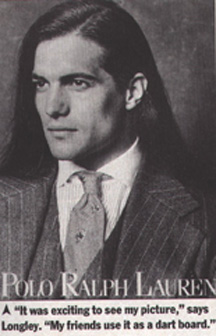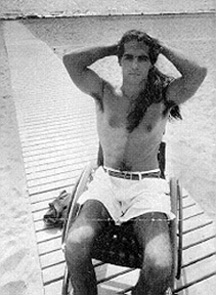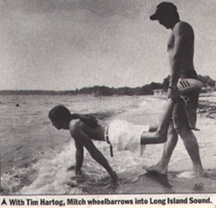A FACE TO REMEMBER
From: People Magazine, October 21, 1991
Story by: David M. Hutchings
Photography by: Co Rentmeester
 Overcoming paraplegia, Mitch Longley became a model, and now he's an actor. A
quick look at Mitch Longley modeling a gray chalk-stripe suit in a current Ralph Lauren
magazine ad, and it's obvious why he has become, almost overnight, a high-fashion star.
His sculpted profile and shoulder-length jet-black hair make him a dramatic choice to pose
for the head-and-chest photograph. But were the camera to travel down his 6' frame, one
would see that Longley, 26, is different from his chin-jutting competitors: he is a
paraplegic who has been confined to a wheelchair since he was injured in a 1983 auto
accident. Overcoming paraplegia, Mitch Longley became a model, and now he's an actor. A
quick look at Mitch Longley modeling a gray chalk-stripe suit in a current Ralph Lauren
magazine ad, and it's obvious why he has become, almost overnight, a high-fashion star.
His sculpted profile and shoulder-length jet-black hair make him a dramatic choice to pose
for the head-and-chest photograph. But were the camera to travel down his 6' frame, one
would see that Longley, 26, is different from his chin-jutting competitors: he is a
paraplegic who has been confined to a wheelchair since he was injured in a 1983 auto
accident.
Mitch was discovered when some pictures taken by a friend were shown to fashion
photographer Bruce Weber. The photographer, who likes using real people instead of models,
was impressed enough to invite Longley to a fashion shoot last May (1991). Weber took some
test shots and was impressed not only by Mitch's profile but also by his positive attitude
toward life and his energetic work on behalf of the disabled. "I thought he was great
looking, and I found him so inspirational," says Weber. "He was in this terrible
accident and, instead of hiding in a shadow, had the courage to face it."
The courage has paid off. After seeing Weber's shots, Lauren signed up Mitch for his ads.
The exposure - plus acting classes - led him to casting director Geoffrey Johnson. Now
Longley is about to debut on the tube: On Friday, October 25 (1991), he begins a recurring
role on the NBC soap Another World, playing a wheelchair-bound lawyer. Plans call
for his character to be involved in a romance. For Mitch, the exposure fulfills a dream.
"What this tells people is that being disabled is just not that big of a deal,"
he says. "The goal of a disabled person is just to be regarded as equal."
 It has been a long and painful journey to that end. On March 13, 1983, after
partying over a few beers with friends, he started the short drive to his Connecticut
home. At 2:30 A.M., alone and not intoxicated, he says, Longley fell asleep at the wheel
and crashed into a stone wall. Unconscious, his back broken, he was rushed to a local
hospital and emergency surgery, where his battered right eye, forehead and lacerated liver
were repaired. It has been a long and painful journey to that end. On March 13, 1983, after
partying over a few beers with friends, he started the short drive to his Connecticut
home. At 2:30 A.M., alone and not intoxicated, he says, Longley fell asleep at the wheel
and crashed into a stone wall. Unconscious, his back broken, he was rushed to a local
hospital and emergency surgery, where his battered right eye, forehead and lacerated liver
were repaired.
Three days later, the senior at Brien McMahon High School in South Norwalk, Conn., was
transferred to New York University Medical Center, where doctors inserted two rods to help
fuse his spine. He was told he would never walk again. "I remember asking my mom,
'What do I do with the rest of my life?'" he says. "I kept thinking, 'This isn't
supposed to happen to me.'" So it seemed.
Raised in the comfortable Rowayton section of Norwalk, he was the second child of Betty
Longley, a nurse, and her husband, John, a food-services executive. (Mitch's brother,
Matt, 28, is a graphic artist in Norwalk.) In high school, Mitch worked as a busboy at a
local restaurant and played tennis on the school team. He hoped one day to turn pro; he
also planned to study theater at Southern Connecticut State College.
Instead, he spent the spring of 1983 doing intensive physical therapy that included daily  sessions
of stretching and weight lifting, to strengthen his upper body, and agonizing hours in leg
braces. Always he was optimistic. "It just wasn't logical to be unhappy," says
Mitch. According to Longley's high school buddy Peter Ahl, 26, one of the two friends who
found Mitch after his accident, "He's a little bit cocky and a little bit arrogant,
and I think that helped him out a lot." sessions
of stretching and weight lifting, to strengthen his upper body, and agonizing hours in leg
braces. Always he was optimistic. "It just wasn't logical to be unhappy," says
Mitch. According to Longley's high school buddy Peter Ahl, 26, one of the two friends who
found Mitch after his accident, "He's a little bit cocky and a little bit arrogant,
and I think that helped him out a lot."
Mitch returned home the day before his 18th birthday. His parents had separated in 1982
but reconciled on the night of his accident. "A crisis situation can either pull you
together or tear you apart," says Betty, 52. "Mitch's accident showed us we had
a common goal besides ourselves. Whatever issues bothered us before just weren't issues
anymore."
After a year of outpatient care in Norwalk, Mitch enrolled at Northeastern University in
Boston in 1984 to study speech communications and philosophy. That's where his activism
took root. "I had watched a lot of TV, and I noticed they never used disabled people
in ads or as characters," he explains. "That bothered me." Soon afterward
he spoke out to some 200 students in his freshman communications class. "I talked
about how people sometimes treat you differently when you're in a wheelchair and how that
hurts," he says. "Sometimes they won't even look at you." Mitch spent his
final year before graduation in a paid internship program, working with disabled kids in
San Francisco.
 The success of his Lauren ads springs from his brooding sensuality, and
Longley is eager to dispel one major misconception about the disabled. "People think
we are not even sexual, and that's just not true," says Mitch. "Your movement is
limited, and you can't just jump on a bed, turn off the lights and do all that stuff. You
need to talk and communicate, but I think you should do that anyway." He is not
currently dating anyone, and that's okay with him. "I've had my heart broken a few
times, but it's not because someone left me in a wheelchair," he says. "I just
can't commit right now." The success of his Lauren ads springs from his brooding sensuality, and
Longley is eager to dispel one major misconception about the disabled. "People think
we are not even sexual, and that's just not true," says Mitch. "Your movement is
limited, and you can't just jump on a bed, turn off the lights and do all that stuff. You
need to talk and communicate, but I think you should do that anyway." He is not
currently dating anyone, and that's okay with him. "I've had my heart broken a few
times, but it's not because someone left me in a wheelchair," he says. "I just
can't commit right now."
 Mitch now (1991) lives in Rowayton in an apartment not far from his parents.
The building is specially adapted for the elderly and the disabled and includes such
features as outdoor ramps, assist railings in the bathrooms, and modified kitchen
facilities. Mitch drives a specially adapted 1983 Buick that is equipped with hand
controls. The car was given to him eight years ago by the people of Rowayton. Still, notes
brother Matt, when you spend time with Mitch, you tend to forget his special status. Says
Matt: "We don't even notice the chair anymore unless we have to go up a flight of
stairs or something." Mitch now (1991) lives in Rowayton in an apartment not far from his parents.
The building is specially adapted for the elderly and the disabled and includes such
features as outdoor ramps, assist railings in the bathrooms, and modified kitchen
facilities. Mitch drives a specially adapted 1983 Buick that is equipped with hand
controls. The car was given to him eight years ago by the people of Rowayton. Still, notes
brother Matt, when you spend time with Mitch, you tend to forget his special status. Says
Matt: "We don't even notice the chair anymore unless we have to go up a flight of
stairs or something."
Lately, Longley's passion has been starting a foundation to help the disabled in
developing countries, and he has also turned his focus to sports, winning singles and
doubles matches on the national wheelchair foundation circuit. Speaking for many who are
amazed by his energy and vitality, friend Tim Hartog, who has known him since childhood,
says, "Mitch isn't handicapped. We thought we'd be the ones supporting him, but he's
the supportive one."
Back to Articles |